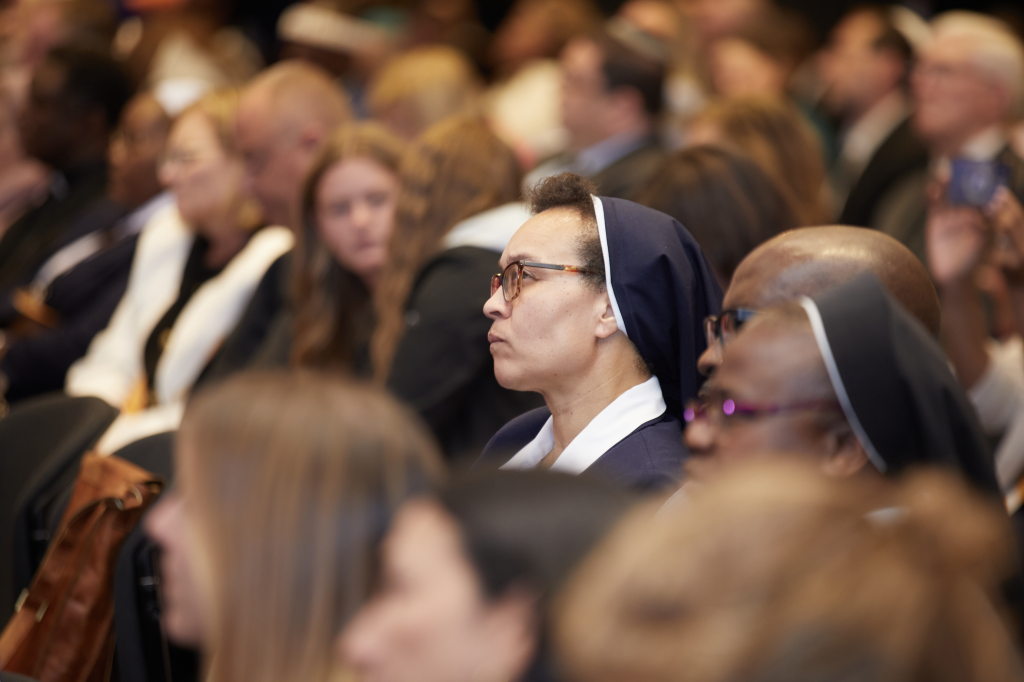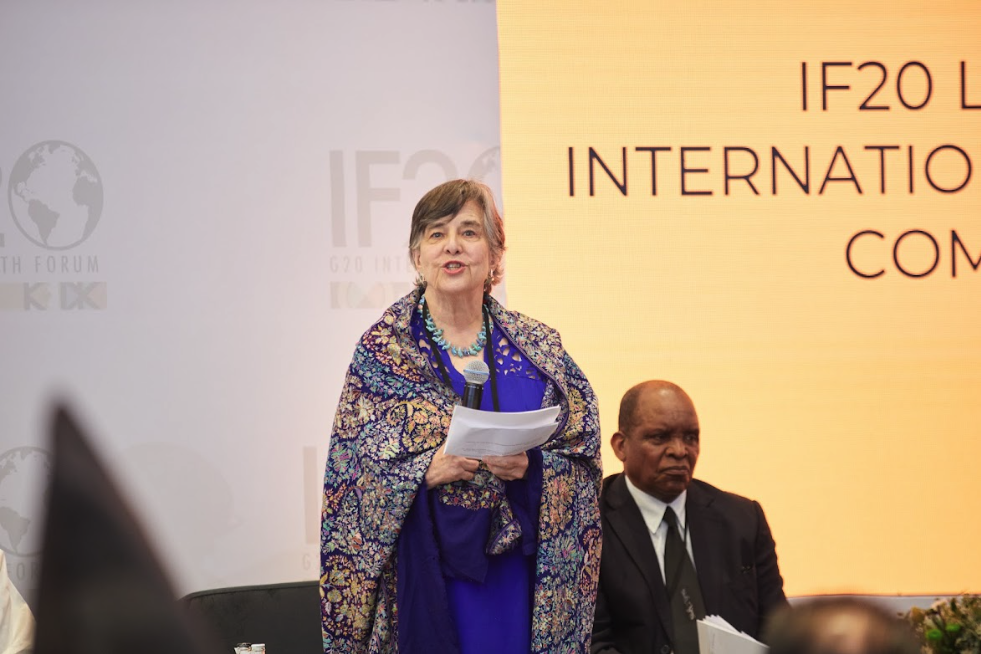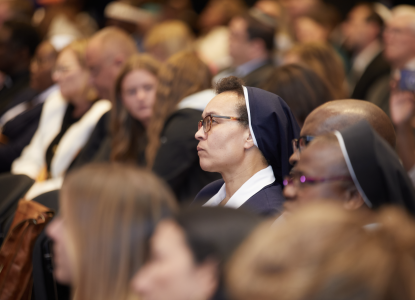Near the beginning of the IF20 South Africa meetings in Cape Town (Aug 10-14), Katherine Marshall, Vice President of the G20 Interfaith Forum, offered the following comments as an overview of the context behind the IF20 and its priorities this year, and where the organization hopes to head next. All sessions of the forum can be viewed on the G20 Interfaith YouTube Channel, here.
Katherine Marshall, August 12, 2025
– – –
This segment provides an overview and context for the conference and the G20 Interfaith effort, as I address, very briefly, several framing questions: Why the G20, why faith, why interfaith, why the G20 interfaith Forum, why South Africa, why the five issues we’ve selected, and where does this suggest that it takes us next?
Why focus on the G20?
The answer is embedded in broader, looming questions today about global governance, power relationships, and the effectiveness of global institutions: a topic of endless speculation and concern. We have some specialists here who focus precisely on these issues, who can shed some light, but suffice it to say that within the overall universe of transnational institutions, the G20 has an important and rather special role. We are all very conscious of the critical importance but also the limitations on the United Nations system. And we hear too much about the G1 or the G2 and the polarization that stymies action, especially by the UN Security Council. We follow and appreciate the roles of the G7/G8, and of other groupings (the G7+, for example). It was in 1999 that the G20, a broader group than the G7/8, was established. The aim was to be more inclusive, to bring in more voices than simply those that were the world’s most wealthy and the most powerful. The 2008/9 economic crisis and the global COVID-19 emergencies gave extra weight to the G20 as a crisis management body.
Thus since 1999, the G20 has met annually, initially simply as a group of individual leaders. In other words, it’s a leadership summit. However, over the years, the G20’s role and processes have moved increasingly from its initial mandate of simply crisis management, especially economic crisis action, to deal with most of the global agenda, that is, the priority issues that are of concern to leaders.
Some experts see the G20 as the most important, or perhaps the least flawed, or weak, among global institutions in 2025, though others point to erosion of impact with geopolitical polarization. The G20 clearly has special roles and capacities, a nimbleness and flexibility that other institutions lack. It does, nonetheless, sit among a whole series of other institutions and meetings, of the United Nations, regional meetings (ASEAN, SADAC, etc), the BRICS initiative, etc. However, the G20 is our clear mandate. And as everyone here knows who has seen the many signs about the G20 arriving at the airport, the 2025 summit of leaders will be in November in Johannesburg. So that is our immediate focus.

The next question is: why faith?
You heard an echo in Suluk Sivarasa’s video message and many others of the core argument: that religious actors and voices need to be part of the global governance systems, but too often are not. At some levels, the arguments seem quite obvious: the sheer size of religious communities, their historic and present powers, and their importance in people’s lives. But at other levels, we know that engaging religious actors, especially vis a vis states, is infinitely complicated and sometimes contentious. In many respects, in today’s global institutions, the roles of religion, despite their critical importance in so many ways, are simply not part of global governance processes. And, as we hear too often, if you’re not at the table, you end up on the menu. Therefore, there has been a consistent, rather diverse set of efforts over the years to bring the best of the religious voices, and I emphasize the best of religious voices, into global discussions, whether it is about Gaza or Sudan, about climate change, about health, about education, about water supply, about energy, about AI, and so on. So we are very much part of that continuing effort to bring in a in a thoughtful, balanced, inclusive way, voices from religious and faith communities into the discussions and policy formation that represent global agendas.
There are an extraordinary array of institutions working to this end. I highlighted in my opening comments yesterday our reliance and focus on what we call “a network of networks”. In other words, we build on some forty different organizations and alliances working on a wide array of topics. Many people represented here are part of those different networks, that include Religions for Peace, United Religions Initiative, World Council of Churches, ACT Alliance, International Network of Engaged Buddhists, the Global Network of Religions for Children, just to name a few. So that’s the voice of faith “at the table”, or the very different voices, which we heard from and about yesterday.
Appreciating the different voices is absolutely critical, whether it’s at the African Union or the South African government, the United States government, etcetera., but it is also vital to trace the threads and core of common purpose (we call this strategic religious engagement). It’s not easy, because these voices or the institutions we hear from have wide differences, from country to country and on specific topics. As an example of the challenges, part of G20 and other processes focus on gatherings and common discussions by ministers, or “ministerials”. That’s proved especially difficult in the case of religion. Some countries have powerful ministries of religion, while others have virtually no formal entity with continuing relationships, or even a hostile, over-secularized approach. That makes efforts to organize a religious ministerial parallel to, for example, those meeting about health or education, very difficult.
Our efforts are part of a complex community that has taken shape around the G20 process, notably as it has expanded from a focus on economic crisis to the far broader global agendas (well defined in the Sustainable Development Goals—SDGs). Very briefly put, they cover what are known as the five Ps: People, peace, prosperity, planet, and partnerships. What has emerged is a community, some term it a constellation, of organizations and efforts, that involve ministerials, working groups, task forces, and what are called engagement groups. There are 13 engagement groups now, including for example, the B20 (business), C20 (civil society), Y20 (youth), W20 (women), T20 (think tanks), and so on. Each brings actors from different countries but especially G20 member countries together and they make proposals. The G20 Interfaith Forum is a part of this effort. It does not have formal status but operates in similar ways. An important innovation launched in 2024 in Brazil is a Social Summit immediately before the Leader Summit, that brings together all the civil society actors, thus both formal and informal engagement groups.
And why interfaith?
Solidarity, of cooperation, of collaboration: we have heard those are ideas and words repeatedly from the start of these events. So that brings us to interfaith. It was stressed yesterday that we know from much experience that working together is more effective than working separately. We return to the Hans Kung/Parliament of World Religions framing that links peace to dialogue, understanding, and cooperation among religious communities: No peace without peace among religions. And there are many vital interreligious, interfaith, and multifaith efforts that work to those ends. Not everything will involve everyone, but inclusion and understanding are vital and the more we can identify common ground the more effective we will be. Renier Koegelenberg just gave us a wonderful, practical distillation of the power of interfaith when it works well, as it did during South Africa’s transition from Apartheid. We saw during the Jubilee campaign in the year 2000, the power of faith to transform the dialogue about poor country debt. And our hope is that the interfaith voice, which you see reflected in two books on faith voices about hunger and food, and faith practical experience, that were part of your package, can help transform the contemporary debate about hunger and poverty, bringing a moral voice but also a practical conviction and paths together. We emphasize that all different religious traditions care about poverty and about hunger, as well as thirst and other aspects of vulnerability and inequality. Thus we are building on the many global Interfaith alliances, the global interfaith effort, or movement, to this end. It’s about being inclusive and bringing together the best of the best in terms of moral force, but also of experience and passion and ideas, thus contributing to the global, multipartner effort.
This is a framework of the basic reasons and mandate of the G20 interfaith Forum and our work here in Cape Town.

Why the G20 Interfaith Forum?
We are not by any means the world’s largest interfaith organization nor are interreligious relationships our primary focus. We build on the work of interfaith organizations, which represent both the global movement and more local initiatives. More important, promoting interfaith understanding and cooperation is far less our purpose than crossing bridges and divides between religious and other communities. Interfaith work is about solidarity and cooperation and building understanding, but that is not the G20 Interfaith Forum’s primary end.
The G20 interfaith has an eleven year history. It was launched in 2014 during the Australian G20 presidency. Brian Adams, who is here, played an important role in that launch, organizing a meeting linked to the G20 Summit. It had a primarily academic flavor, and during the early years religious freedom was a particular focus. Increasingly, and particularly after the German presidency in 2017, we realized that if we wanted to be part of the G20 process, we needed to focus more sharply on the G20 agenda and process. Our G20 Interfaith agenda had to go beyond issues of concern primarily to religious communities, and we needed to have a clear policy focus. That has driven meetings and analytic work, dialogue, and advocacy ever since, in the course of meetings centered each year on the G20 host country and parallel work and dicussions. Cole Durham in his introduction highlighted the core work of the organization and the continuing effort to enhance our reach, collaboration through a “network of networks”, and our focus. Other partners are also deeply involved, including several foundations and some of the leading faith-inspired Non-governmental organizations (notably World Vision, Islamic Relief USA, and LDS Charities).
Apart from a core structure, a board, and an advisory council, a central feature of the G20 Interfaith Forum is that it works each year with a local committee from the host country. The forums are thus a joint effort, as is the case here, with a focus on the global agendas alongside a focus on the host country.
And why South Africa?
A characteristic of the G20 is that the leadership rotates year by year to different member countries that are part of the G20. It has no secretariat, no permanent structures, no office. De facto leadership is provided, besides the host country which defines the core agenda, by what is called a troika, which includes the host from the previous year, the current host, and the host for the following year. Thus the current troika is Brazil (that’s why you heard from Rodrigo Alves about highlights of Brazil’s presidency in 2024), South Africa, president in 2025, and the United States in 2026 (we might call that a $64 billion question in terms of how it will be handled). So that is why we’re here in South Africa, looking to the November G20 Leaders Summit.
Through this year, both the local South African organizing committee and the G20 Interfaith Forum have organized a series of meetings which have been designed to focus on the main issues to look at, what we should recommend, and where we should be heading in the future. Meetings have included two meetings in Pretoria, one in Cape Town at Bishopscourt, an African Union focused conference in Addis Ababa, and gatherings in several other settings. All have led up to the Cape Town conference, with an eye also to linking to prior years’ work and looking to the future. Thus we need here to focus on November 2025, but also to look to what will happen in 2026 and beyond.
And what should the G20 Interfaith Forum recommend?
Around us here in the conference site, you see (amplifying the core theme of Ubuntu in Action) words and phrases that focus both on South Africa’s priorities (solidarity, equality, sustainability), and the five focus areas defined by the G20 Interfaith Forum community – food security, refugees, action on international finance, disaster preparedness, and education linked to social cohesion. The G20 Interfaith alliance (justly termed an alliance), has aimed to focus on a series of issues where there is consensus, where there is solidarity, where we see a direction for action, and which relate both to core religious areas of care and priority and to the specific G20 agendas set out by the host country government.
The issues we highlight focus on the current, immediate priorities as set out by the host government each year and on continuing concerns for policy action. The G20 Interfaith alliance draws on the considerable thought and analysis by network members on the issues, and aims to present practical, meaningful recommendations to the sherpas (as the different country officials who support the heads of state and the overall process are known). Ideally there are working groups drawn from different communities and countries who delve into the issues, and a review process that provides feedback and makes the difficult call on which topics should be the annual focus. The Cape Town meeting priority issues thus reflect considerable discussion among partners as well as with South African officials. Our central focus on hunger and poverty reflects both a central priority for many religious communities, the urgency of the current moment with grave famine challenges before us, and the launch of the Global Alliance Against Hunger, allowing us to focus on the vital importance of faith as an integral, central part of the global partnership.
There is considerable continuity from previous years, notably Brazil and India. We aim to build year after year on partnerships and ideas (the focus on human trafficking is an example of a topic that has been a focus over several years). We focused a lot on COVID measures and health more broadly during the COVID pandemic. We address various issues year after year, including racism, a consistent issue, and what religious communities can do about corruption. Peace is not the priority nor the focus of the G20 itself, but inevitably the conflicts in the world cannot be avoided by leaders or by the G20 Interfaith Forum. Work for peace and its links to development and humanitarian action, and underlying geopolitical issues, are part of the G20 ethos, part of the discussion.
But for this year, 2025, we see two imperatives: to focus on a limited number of issues (no more than five, the fingers of one hand), and, as far as possible, to link them (in solidarity) to the work of other engagement groups and, of course, to the South African government priorities. The result of discussions and an emerging consensus, you see reflected the five centerpiece issues that are highlighted throughout the conference. We hope over these days to sharpen ideas in each of those areas, building on prior work, and looking to both the Social and the Leader summits in November.
But the theme that we hope echoes most powerfully is the need for the G20 leaders never to forget those who are left behind, in the spirit of Ubuntu, in the spirit of South Africa, of Mandiba, of Mandela and Desmond Tutu, whose leadership and prophetic voice we recall so often. That imperative should be at the center of their agenda and their attention, as well as ours. That’s the message that we’re trying to sharpen as we advance and move forward.
– – –
Katherine Marshall is a senior fellow at the Berkley Center for Religion, Peace, and World Affairs at Georgetown University. She serves as the vice president of the G20 Interfaith Association and executive director of the World Faiths Development Dialogue. With over three decades of experience at the World Bank, Marshall has been at the forefront of addressing development issues in the world’s poorest countries, with a particular focus on the intersection of religion and global development.


